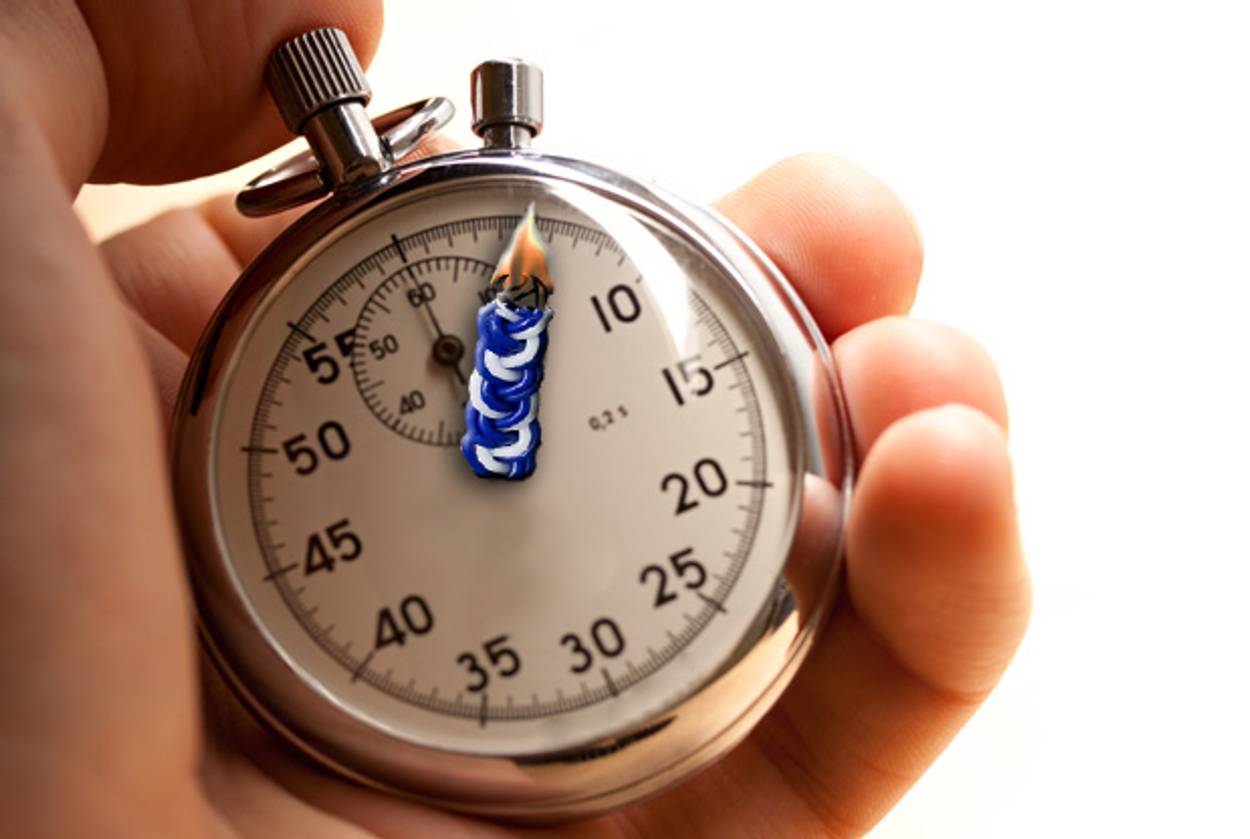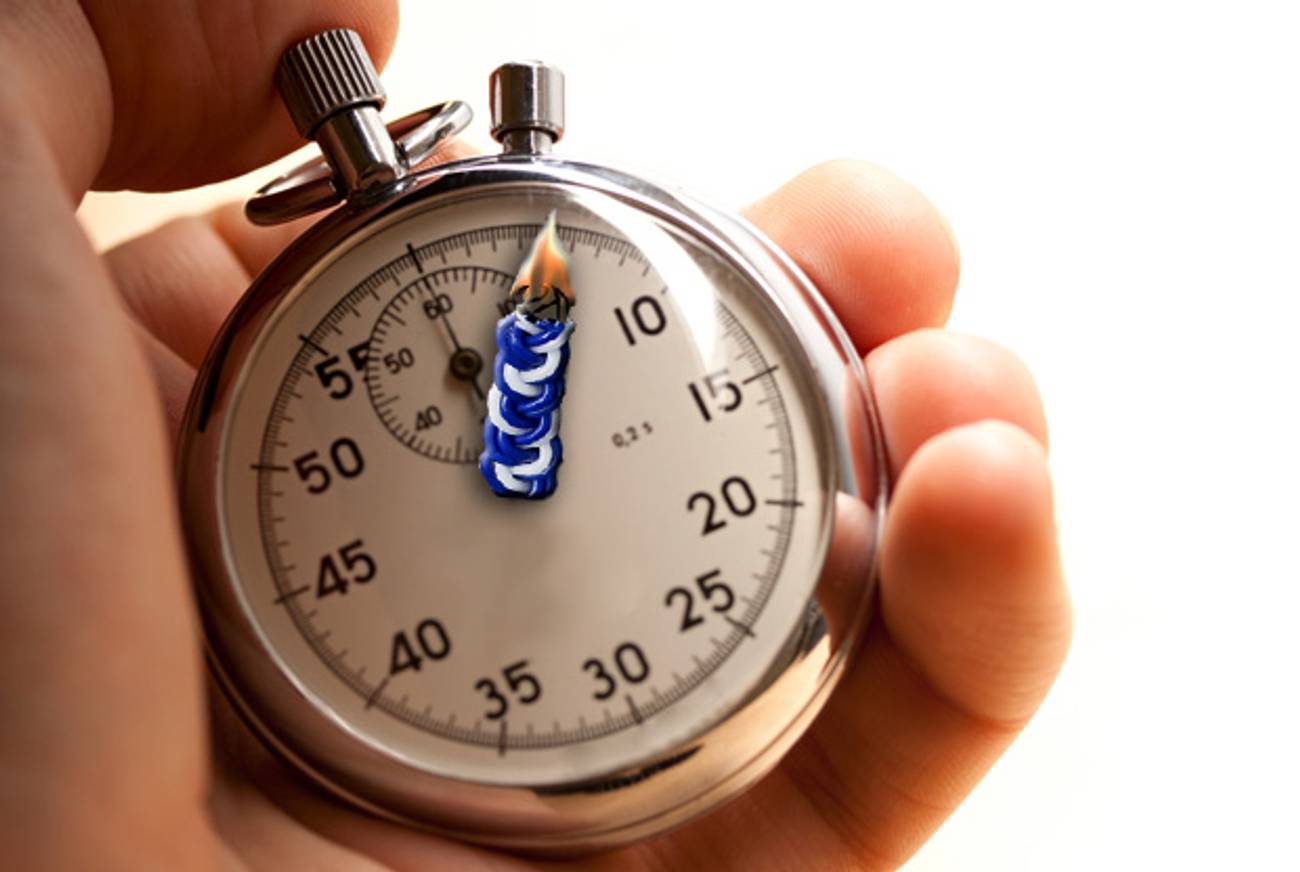Brake for Children
I’ve become the overscheduling parent I hate. But Shabbat, havdalah in particular, can slow kids down.




A friend of mine recently opted not to enroll her 5-year-old in a Daisies (wee Girl Scouts) troop. When my friend politely explained to the mom who’d invited her that her kindergartener already had enough on her plate, the other mom gasped, “But if you don’t start now, she’ll be behind!” Laughing, my friend asked, “Behind on what, s’mores-making?” The other mom said, with manic intensity: “Behind on badges!”
I get it. As parents, we’re under all kinds of pressure: Do more, do faster, do earlier. I was once determined not to succumb to pressures to overschedule my kids. But guess what: The girls now have Hebrew school twice a week; Josie has a flute lesson and flute group practice back-to-back on Fridays as well as debate team on Thursdays, and Maxie has cello on Tuesdays. They both will do the Hebrew school musical, which will start with one rehearsal a week and wind up with several a week before opening night in May.
I am that overscheduling parent, despite my desire to give my kids a break. But figuring out what to cut isn’t easy: Hebrew school is non-negotiable for me. Jonathan really wants the girls to play instruments. The kids themselves chose the musical and debate. When our pediatrician suggested the girls do after-school sports because it’s vital to get enough exercise, I snorted so hard I may have gotten spit on her. Uh, with what additional free time? But maybe I should cram something else into their agendas, because OMG, obesity epidemic! Or maybe I’ll just make sure they run from activity to activity so fast they have no time to eat.
I kid, but I don’t. I want more serenity! Which is why I was happy to discover Fed Up With Frenzy: Slow Parenting in a Fast-Moving World, a new book by Susan Sachs Lipman that advocates living a slower-paced, more relaxed and connected family life. (Full disclosure: Lipman and I are both members of the online community The Well, but I don’t know her in real life.) Lipman is the social-media director for the Children & Nature Network, an international movement dedicated to connecting children with nature; she blogs at the award-winning Slow Family Online.
“There are so many benefits to slowing down,” Lipman told me in an interview. “And more are being uncovered through research all the time. PDF—the acronym for playtime/downtime/family time—betters kids’ academic performance, enhances their ability to self-regulate, helps them learn cooperation and their own boundaries. It fosters resilience and empathy. Unstructured play has been found to enhance creativity, self-discipline, flexibility, and problem-solving. And it just bonds your family. My daughter will be 17 in two weeks, and we’re a really close family; we have so many traditions and memories. We just went to a pumpkin patch as we do every fall, and Anna drove us this time! It was a really poignant moment—all those years of driving her, every year, and this time she drove us. It also told us something that she wanted to do it as a senior in high school. It was as important to her as it was to us.”
Lipman’s book offers tiny ways as well as big ways to slow down and create family time. For instance, you suburban people might leave a bit earlier for school and park a few blocks away to avoid the crazed drop-off scrum. We can all have family dinner without screens—televisions, phones, tablets, or otherwise. We can share family stories.
Such small solutions seem attainable and sustainable. Here in the city, taking walks in the woods is a trick. (We do try to avail ourselves of the woods when we visit less-urban friends and family, and strolling in the city has its own pleasures.) At the moment, I’m simply not willing to cut any of my kids’ activities. (Clarification: If they really stop enjoying music, Jonathan and I will discuss whether to drop it. Discuss, as you know, means that one of us currently says yes and the other says no. They will quit Hebrew school when the Messiah comes. And maybe not then.) I love Lipman’s suggestions for family activities—games, crafts, recipes—but oy, I can’t quite imagine making regular room for them.
We do, however, have one inviolable weekly ritual—and it’s an opportunity to slow down no matter what else is scheduled during the week, an opportunity that all Jewish parents can take advantage of: We have Shabbat.
On Friday nights, we light candles, do kiddush (the short version) and hamotzi. Then we have family dinner without our usual distractions. It’s small, but it’s big. It’s significant to me that we’re offering the same blessings as Bubbe, some of the girls’ camp friends, as Jews around the world. The girls’ elementary school has only a tiny number of Jewish kids. (Josie’s middle school has more.) Every year Maxie notes whether there’s one other Jew, a half-Jew, or no Jews in her class. I’ve written about why I love this school. But while it has a wonderful community, it does not have a Jewish one. Shabbat reminds us that we’re part of a big Jewish community, even when I don’t always see it.
After dinner, our version of Shabbat wouldn’t meet Certain People’s definition. We usually watch the episode of Top Chef that aired two days earlier. Then on Saturdays, we occasionally go to shul, but more often we hang with friends or stroll around the Lower East Side (Hester Street Fair, Doughnut Plant—we like the snacks). We use electricity, we spend money, we play Rock Band. It might not be everyone’s idea of Shabbat, but it works for us, and still feels like a day of rest in our own way.
Our shul recently gave me an idea for a way to make it even better. Last week, I attended a family program on havdalah, the ceremony that marks the end of Shabbat and the beginning of the week. Groups of parents and kids were each assigned parts of the havdalah service and had to think of the reasons behind each element: the braided candle, the spices, the words of the songs. As the other groups talked, I reflected on how it would be nice to add this to our lives on a regular basis at home. We could get a beautiful spice box, or make pomander oranges, and given my children’s love of fire (they’re like Beavis and Butthead that way) I think they’ll love getting to hold a beautiful braided candle. The aesthetics of this ceremony are awesome and hypnotic. It’s short; it doesn’t require leaving the house; it’s participatory; it involves singing; and it smells good. What more could you want?
Josie’s and my group had the assignment of thinking about why we study the shadows our fingers cast in the candlelight. One little girl suggested that we’re looking to see if our fingernails are clean, so we can start the week fresh. Another thought we were studying our hands because they represent the work we do, and we want to do good work during the coming week. I suggested that we look at the shadows because their angles are different depending on where you’re standing in relation to the candle, and maybe that’s a reminder that we should consider other people’s perspectives. (All of us were wrong. But so mystical!) Then we opened the envelope provided, which held the “real” meaning of the ritual: We’re completing the blessing by “using” the light of the candle, not letting it go to waste.
So much of havdalah fits in with the Slow Parenting movement (and the Slow movement in general). The braided candle symbolizes how Shabbat and the week are intertwined. The fact that we incorporate wine into our ceremonies in a measured way, I think, helps normalize alcohol for kids: It can be a gentle part of family and religion, not merely an illicit substance we pour generously into red Solo cups while shrieking “Woo!” at frat parties. Thinking about Eliyahu HaNavi, about whom we sing, makes us consider how we treat strangers. I think havdalah could be a wonderful capper on our Shabbat and a slow way to ease back into the frenzy of the rest of the week.
Smart folks have written about how we secular types can benefit from Shabbat. And folks like Lipman have written thoughtfully about children’s need for repetition and ritual. Havdalah helps with both.
When I told Lipman about my little revelation, she responded, “I love havdalah; we had a havdalah service to start our wedding. Rituals like this help kids mark time, explore the rhythm of days, weeks, years. Nighttime rituals in general are so important—they help kids sleep well and feel comfortable in their place in the family and the world.”
Furthermore, Lipman says, religious and family rituals help restore awe to children’s lives. We live in a cynical age. But the more we can do to get in touch with things that are a little bit mysterious (fire, wine, heady scents, alchemy), the better for our families and our kids. “Awe can be missing in a technology-fueled life,” she said.
So, we can’t—or won’t—slow down as much as I’d like. But there are little things we can do, every week, to put the brakes on our kids’ runaway schedules. I’m going to try harder to do them.
***
Like this article? Sign up for our Daily Digest to get Tablet Magazine’s new content in your inbox each morning.
Marjorie Ingall is a columnist for Tablet Magazine, and author of Mamaleh Knows Best: What Jewish Mothers Do to Raise Successful, Creative, Empathetic, Independent Children.
Marjorie Ingall is a former columnist for Tablet, the author of Mamaleh Knows Best, and a frequent contributor to the New York Times Book Review.